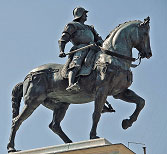
Coursework The required number of courses and timeline for coursework follows History Department guidelines for History students in the combined program. In general, it is expected that courses in early modern studies constitute about one-third of the student’s doctoral coursework, and
at least one course with an early modern focus must be taken outside the student’s primary department. Students will also enroll in EMST 700 and EMST 800 during the second year, neither of which count towards the total number of courses required for the Ph.D. in History. In the spring of third year, students in the History Department are also encouraged, but not required, to enroll in EMST 900.
Advising A student’s academic adviser will be a member in the History Department. A student may also choose to have as co-adviser a faculty member affiliated with the Program in Early Modern Studies who is not affiliated with History.
Language Requirement The language requirement will follow the History department requirements.
Qualifying Exams Qualifying exams will follow the History department requirements with one added requirement that at least half the exam content must be about early modern subjects (the equivalent of 1.5 fields if the student completes 3 fields, 2 fields if the student completes 4 fields).
Prospectus and Admission to Candidacy Procedures for the prospectus will follow History Department guidelines. At least one faculty member affiliated with the Program in Early Modern Studies must be on the committee. Upon completion of all predissertation requirements, including the prospectus, students are admitted to candidacy for the combined Ph.D. degree.
Dissertation At least one faculty member affiliated with the Program in Early Modern Studies must be on the dissertation committee.
Teaching A student’s teaching assignments will be determined by History, with every effort made to assign a student to at least one course (or course equivalent) in early modern studies.